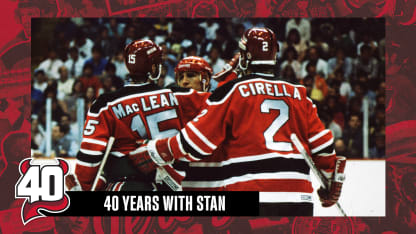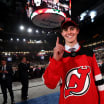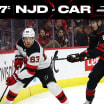Many songs have meaning even when it comes to National Hockey League teams. "You Are My Sunshine" could apply to the Devils for any fan. And when things go bad -- hey, it happens -- there's always, "I Got A Right To Sing The Blues."
For zany moments, how about "I Had The Craziest Dream Last Night."
And guess what? Each tune fits this second edition of The Maven'sBest, Worst And Most Unusualof the Devils first 40 years.
Here's the trio:
The Best, Worst and Most Unusual Pt. 2 | 40 YEARS WITH STAN
In part two of the best, worst and unusual series, Fischler delves into the famous blizzard night and the goal that sent the Devils to their first playoff appearance

By
Stan Fischler
Special to NHL.com
"They had a solid backup goalie in Bob Sauve, recalled Chris Reilly who worked home telecasts for visiting tv crews. "But they needed someone younger and stronger between the pipes."
At first, it appeared that Lamoriello would have to wait until the postseason to solve the goaltending challenge. But after careful review, the general staff noted that in 1985 the Devils had drafted a big, Canadian puck stopper who had just starred for Team Canada in the 1988 Winter Olympic Games in Calgary.
"We figured that Sean Burke was worth a shot," Lou added, "and he sure turned out to be a problem-solver."
Still, Schoenfeld could have used a government-approved observatory telescope to see a playoff berth. But that was in the dim distance, What mattered was the immediate present.
Schoenfeld: "Slowly, but surely, we began closing the gap. The guys were taking it a game at a time and -- pretty soon -- we found ourselves neck and neck with the Rangers."
The melodrama could not have been more heart-throbbing and the arithmetic underlined the point. Down to the final weekend of the season, the Devils' record was 37-36-6 with 80 points and a tie with the Rangers for fourth place.
It came down to this: the final playoff berth would be decided on the last Sunday or the regular season. If the Rangers beat Quebec at The Garden, the Blueshirts would have 82 points and 36 wins.
Ah, but:
Should Schony's skaters triumph at Chicago, the Devils would make it on the basis of having more total wins (38) than New York. Under the best of conditions, Chicago Stadium -- alias The Madhouse On Madison -- was a hostile battleground and this night was no different. After a scoreless first period, Ken Daneyko lifted New Jersey into the lead. But the Black Hawks immediately tied the count and then went ahead, 2-1, on Dirk Graham's goal.
"By now," Schony recalled, "we got word that the Rangers beat Quebec so it put even more pressure on my guys."
With a mere eight seconds left in the middle frame, Pat Verbeek beat Darren Pang in the Windy City net. Into the third period, the teams skated tied at two.
At last -- nearly halfway through the period -- Chicago again took the lead. Time was running out on the Visitors. At home, one Devils rooter grabbed a piece of art paper and scribbled: HELP WANTED -- HERO.
Schoenfeld kept his cool. "Heck," he later reflected, "we had half a period to tie the game. I felt that if we could score one, we could beat them in overtime."
Wisconsin's Mark Johnson found that hero. Just short of the period's 12-minute mark, he fired a laser at Darren Pang. Chicago's diminutive goalie made the save but left the rebound unattended.
John MacLean swooped in from the left side and bulged the twine behind Pang. It was 3-3 and anybody's hockey game as regulation ended and sudden death overtime was only 15 minutes away
Huddled in the visitors room, captain Kirk Muller told his charges that a loss would be as bad as a tie. "The trick," warned Muller, "is to play a solid period and hope for a break."
There were no breaks through a minute-and-a-half of sudden death. Then, the Devils attacked. With a little more than two minutes gone, they penetrated the enemy perimeter. The Hawks tightened their defense and regained the puck.
They tried an exit clear along the left boards.
"Had it gone over the blue line," said Muller, "we'd have had to regroup and who knows where that would have taken us."
But one of the most popular Devils, defenseman Joe Cirella, managed to get his body in front of the clearing pass. With the puck on his stick blade, he fired a "Hail Mary" shot goalward.
MacLean: "As soon as Joe let it go, I headed toward the net; hoping something good would come of it."
Pang made the save but, once again, failed to control the rebound. Meanwhile -- as if the puck was doing MacLean's thinking -- the biscuit found its way to Johnny Mac.
"I knew our whole season would go down the drain if I missed," Johnny Mac concluded. "As soon as I felt the puck on my stick, I let it go with all I had in me."
From a Devils' viewpoint, the flight of that puck was one of the most beautiful visions imaginable. "Somehow," chuckled Johnny Mac, "it went in!"
For the first time in New Jersey hockey history, the Devils had gained the previously elusive playoff berth. And, in case you haven't figured The Maven's thinking, it was one of the most magnificent scenes I ever witnessed in my 40 years of following Doc Mac's team.
In this case, "The Jersey Bounce" went the Devils' way!
THE WORST WEATHER IN DEVILS HISTORY -- JANUARY 22, 1987
This was to be just another hockey game between the high-flying Calgary Flames and low-flying Devils at the Meadowlands Arena. Looking back, January 22, 1987, would be a day that lived in blizzard-ry. Not to mention heroism for the likes of Ken Daneyko, Doug Sulliman, Peter McNab and assorted other stickhandlers who literally weathered the storm to end all snowstorms.
But one that could not end the hockey game.
For The Maven, it started innocently enough that morning when my wife, Shirley, offhandedly said, "Honey, the weatherman says a storm is on its way."
"No worries," I replied, "Our tech guy, Dave Katz, will pick me up at three and our (SportsChannel) production meeting isn't until four-thirty."
No more than two hours later -- at Noon -- the sky over Broadway and West 110th Street clouded over. "Hey," Shirley announced, "the snow has started and it looks like the weatherman was right. It's comin' down hard."
"No worries," I shot back. "Katz always comes through. Worst case, I'll take the Honda. It's parked right across the street."
At 2 p.m. I took a worried look out the window. This was not a snowstorm; it was a blizzard; a no-kidding-around-blizzard.
What to do? Should I call Katz to be sure he's coming? Nah, he's never failed me. And he said he'd be here by Three. I had a half-hour left so I got my notes, tv equipment and, sure enough, on the dot at three, it was Katz, but he was no phoning from downstairs.
"I'm still stuck in Brooklyn. No way I'm getting out. Better go yourself."
I headed straight for the Honda and knew that the minute I turned onto Broadway, this was trouble, BIG TROUBLE.
The challenges were many, starting with an up ramp at 125th Street that linked with the then-elevated uptown highway. By this time, cars were stuck -- abandoned -- all over the place. But, somehow -- like an eel-like forward splitting the defense -- my Honda bobbed and weaved its way up to the GW Bridge and on to -- lucky me -- the Lower (Jersey-bound) roadway.
My instinct was to avoid the Turnpike so I made a left onto my shortcut route. By now the storm was peaking yet Lady Luck was with me and I made it to the arena parking lot at about 4:30 P.M.
When I got inside, I discovered how fortunate I was. I was told that Devils players were marooned all over the place. And that went for Mister Devil, himself, Ken Daneyo, then the team's rock-solid defenseman.
"I was with a few of the guys," said Kenny. "We left at 3 p.m. and didn't get to the rink until 8:45."
Crazy stories began filtering all over the place.
Doug Sulliman's highway route was totally blocked by an accident.
"I had to do something," the Devils forward asserted, "so I crossed into the 'wrong' lane and got to the arena by driving backward."
Meanwhile, the Flames who were staying at a nearby hotel wisely got to their dressing room earlier enough in the afternoon. Coach Bob Johnson had no worries at all.
"All we were hoping for was that the Devils would have enough players so that the game wouldn't be canceled," said Badger Bob.
Flames forward Jim Peplinski was more upset about the long wait than whether or not there would be a game. "We hung around our clubhouse for so long, it felt like weeks."
Meanwhile, New Jersey's crack forward Peter McNab had to abandon his vehicle miles from East Rutherford. "I just had to walk there," Peter recalled. "When a trooper saw me, he took my car keys and said, 'Not to worry, I'll get them back to you.'" (Miraculously, after the game, the Trooper delivered.)
By normal game time, 7:30 p.m., the NHL still had not canceled the contest. Remarkably, a handful of hardy fans began trickling through the turnstiles. One of them, Andy Martin -- he later would become the Devils' official photographer -- had been working that day relatively close to the arena.
"It took me three-and-a-half hours," Martin smiled, "to drive what usually took me ten minutes."
By 8 p.m. enough Devils had arrived and now it was evident that a game actually would be played. At 9 p.m. all the necessary NHL on-ice officials were in place and ditto for our SportsChannel tv crew.
As for the crowd; well, it wasn't what you'd call a crowd. A grand total of 334 fans had sprinkled themselves around the 19,000-seat barn. (The Devils later reported that 11,247 tickets had been sold.)
To the delight -- and credit -- of the audience, the underdog Devils played one heck of a game. Sulliman delivered a three-goal hat trick and coach
Doug Carpenter's heroic skaters emerged the victors, 7-5.
As for The Maven, having completed my post-game interviews, there was the business of getting back to Manhattan. And, believe me, I had my doubts.
This time I chose the Turnpike west to the GW, forgetting that there was a mile-long uphill climb to the span. As I had feared, a number of large trucks were splayed across some of the lanes but there remained just enough room for my Honda to squeeze through.
Plus, the snow had stopped falling and I made it home safely in less than an hour. When I got back to our apartment, Shirley was there with some hot cocoa and a warm embrace.
She also had a smile on her face. "Remember the gag about the 'Weatherman being 100 percent right, 50 percent of the time?'" she asked.
"Yeah," I said.
"Well," she concluded, "he was 100 percent right today."
So were the Devils. What's more, the club's p.r. guy, Larry Brooks, got the names and addresses of the 334 hardy souls who skidded, traipsed and otherwise made it to the game.
A "334 Club" was created and for years, an annual reunion was arranged by the club.
Looking back, I find it hard to believe that 35 years have passed since that memorable day/night.
Oh, yeah, I should add that Dave Katz made it out of Brooklyn -- the next day!
THE MOST UNUSUAL: THE RUSSIANS NOT ONLY WERE COMING -- THEY CAME!
Following the famed 1972 Soviet vs. Team Canada "Summit Series," it was evident that the Russians knew a thing or three about playing hockey.
It also was as sure as anything, that there was no way that the best Russian players would be allowed to play for National Hockey League teams.
Except for one thing: Devils leaders, starting with owner Dr. John McMullen, and his first lieutenant, general manager Lou Lamoriello, would not take no for an answer on this delicate subject.
"My feeling," Doc Mac explained, "was that changes in the European political situation could come about and bring an easing of relations between East and West. We might lure some Russians to the Devils. At least, it was worth a try."
The initial attempt was made at the June 1983 Entry Draft and it was done without any fuss or fanfare. In the distant eighth round New Jersey selected Soviet defenseman Viacheslav Fetisov as the Devils long shot choice.
Those hockey people who noticed the move figured that it either was a far-distant gamble or, perhaps, a joke. Lamoriello told those who would listen that his club was dead serious.
"I didn't expect any of the Russians to come immediately," McMullen explained. "But we hoped that, perhaps, in the future, it might be possible."
Fetisov's name officially was listed as the 150th pick. But Lamoriello was not finished. With the 213th selection, the Garden Staters went Russian again and this time, added the name of Fetisov's defense partner Alexei Kasatonov.
Really, the media couldn't have cared less. The newspaper guys and gals got excited about Lou's top pick, forward John MacLean, and a goalie right out of Lou's alma mater. Providence College. The diminutive puck-stopper was Chris Terreri who had enjoyed a super season with the Friars.
Meanwhile, Fetisov and Kasatonov competed for Mother Russia in both international tourneys as well as within the Soviet system. For all intents and purposes, they were forgotten hockey players.
But Dr. McMullen keenly followed the winds of European politics and discerned that major changes -- as he had predicted -- were evolving. Lamoriello made a few unannounced trips to Moscow and set the groundwork for more meaningful moves.
Lou: "When the 1988 Winter Olympics were held in Calgary, I went to check out Sean Burke, our goalie of the future, but also to make contact with Fetisov and
Kasatanov. After that, I made more trips to the Soviet Union because it was clear that the political scene was changing there. I had no illusions but my theory was that you have to take the first step to walk the mile."
Following the end of the 1988-89 season, there was a break in the tension. A number of behind-the-scenes negotiations with Doc Mac and the Russian authorities proved fruitful. Even U.S. Deputy Secretary of State John Whitehead got into the act as a catalyst for a deal.
Finally, on July 7, 1989, what once seemed impossible was about to take place at Byrne Arena's Winners Club. A press conference had been called to announce that not only were the Russians coming; two of them actually had arrived.
Before a standing-room crowd, Doc Mac and Lou welcomed the long sought Fetisov, who was given a Number 2 Devils sweater. Surprisingly, the other player was not Kasatonov but rather a barrel-chested blue liner named Sergei Starikov.
"It was a long battle," Dr. McMullen concluded, "but better late than never."
In some ways, the postscript to the monumental event at the Winners Club was as unusual as anyone from the press could imagine.
For starters, Fetisov melded smoothly into the New Jersey lineup but Starikov proved too slow for NHL combat and eventually was dropped from the varsity.
However, the good news was that Lou eventually managed to lure Kasatonov to East Rutherford and Alexei proved as competent -- some would say more so -- as Fetisov.
Still. the strangest aspect of the duet was that they had suffered a political split.
And although they gladly teamed up on the ice as a defensive pair, they militantly refused to converse once their shift had ended; not even in the dressing room after a big win.
And if that wasn't "most unusual," I don't know what was!






